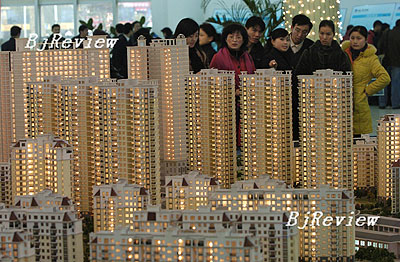
Closely watching the family's spending and living in fear of another interest rate rise have become realities for many Chinese city dwellers who have taken out mortgages that stretch their finances to the limit.
It is the price many pay in order to own a home of their own. But a growing number are beginning to question the sense of taking on such a heavy burden.
"My life has been totally changed since I bought my house. What's worse, the change will last 15 years," said Wang Jun, who graduated from China Foreign Affairs University and is now a middle-class white-collar worker in Beijing with a monthly salary of 5,000 yuan ($1=7.7295 yuan as of March 29, 2007).
In the happy old days, Wang was a social butterfly, who was active in organizing parties and a regular visitor to bars and the gym. But everything began to change when in 2005 he bought a house with a bank loan of 700,000 yuan for 15 years.
"I make five to six grand every month and my wife's salary is something like mine. But we have to pay a monthly mortgage of more than 4,000 yuan, making up 40 percent of our total income, that's a scary proportion in our eyes," said Wang, who has become a regular visitor to the bank to pay his mortgage and is now seldom seen in bars or at the gym.
"I'm about to turn 30 and it's time we should have a baby. Besides, our parents are getting old. The future education and medical expenses, plus our huge mortgage often bother us," Wang noted.
Wang is part of a new phenomenon in China called fang nu, literally meaning "house slaves," which refers to a group of people who spend a large part of their family income paying their mortgage.
These "house slaves" are trapped into a life where everything is dependent upon paying the mortgage. They live in fear of losing their job or falling ill, and they dare not change jobs in case that leads to a loss of security. Entertainment, travel and generally enjoying life all take a back seat to paying the mortgage.
"We have become so sensitive to interest rate changes which we seldom paid attention to before we bought our house. And as a mortgage payer, I certainly don't want it to be raised," said Wang.
The unbearable heaviness of being housed
According to industry insiders, it is regarded as a warning sign if mortgage payments account for a third or more of a household's monthly income. Crossing that invisible line creates a credit risk and could severely impact quality of life.
In a recent survey conducted by Sina.com, one of China's largest web portals, 91.1 percent of respondents said they bought their homes on a mortgage, of which, 54.1 percent said their mortgage payments accounted for 20-50 percent of their monthly income and a shocking 31.75 percent said their mortgage payments represented more than 50 percent of their monthly income.
House prices have been rising since the 1990s when urban housing reforms allowed private ownership of property. At that time, mortgages were so unpopular that banks were forced to create inventive ways to encourage buyers to take one out. Overnight, the Chinese embraced the idea of fulfilling today's dream using tomorrow's money.
A survey conducted by the Beijing Municipal Construction Committee showed that commercial residence buyers were getting younger with the 20-30 years old age group being the main buying force.
"I'm forced to resort to a housing mortgage," Wang said, laughing. "Given the soaring property prices, if you want a house without a mortgage, you either pray to have a rich father or count on winning big on the lottery."
| 